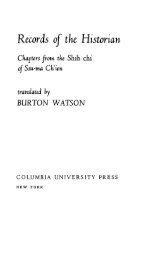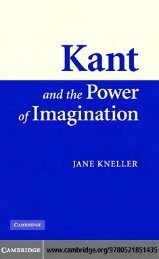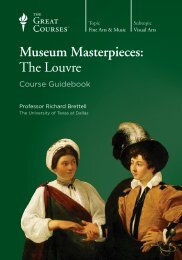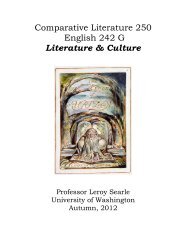Ellipsis of Battle.pdf - University of Washington
Ellipsis of Battle.pdf - University of Washington
Ellipsis of Battle.pdf - University of Washington
Create successful ePaper yourself
Turn your PDF publications into a flip-book with our unique Google optimized e-Paper software.
28<br />
Journal <strong>of</strong> the American Oriental Society 95.1 (1975)<br />
overthrow the full and bless the humble, Spiritual<br />
Beings inflict calamity on the full and bless the<br />
humble. It is the way <strong>of</strong> man to hate the full<br />
and love the humble."23 The wrath <strong>of</strong> Achilles<br />
that leads to heroic action finds no equivalent in<br />
the Weniad. King Wen, nevertheless, practically<br />
took over China in the twelfth century B.C. by<br />
his virtue. Confucius specifies his virtue:<br />
Possessing two <strong>of</strong> the three parts <strong>of</strong> China and with<br />
them serving the Yin; the virtue <strong>of</strong> the Chou can<br />
indeed be called the ultimate virtue!<br />
(Analects VIII 20)<br />
The heroism <strong>of</strong> King Wen is in the governance<br />
by virtue, by meekness; providing the people<br />
with clearings for the growth <strong>of</strong> food;24 and<br />
standing in awe <strong>of</strong> his ancestors. He is pious:<br />
It is clear and all the more splendid,<br />
The ordinance <strong>of</strong> King Wen:<br />
He established the sacrifices<br />
That in the end brought us victory.<br />
It is the auspice <strong>of</strong> the Chou I<br />
(Shih Ching 268)<br />
When King Wen died at the age <strong>of</strong> ninety-seven,<br />
his son succeeded him and is called King Wu.<br />
After many delays, the heavenly mandate ordered<br />
King Wu to carry out the conquest.25 On a winter<br />
day at dawn, he held his court in the old capital<br />
Feng,q sacrificed, and led his army comprised <strong>of</strong><br />
approximately fifty thousand men east to assume<br />
the punitive campaign against the Shang. The<br />
expedition was ritualistically performed, and a<br />
great number <strong>of</strong> the feudal princes all over China<br />
came voluntarily to his help.26 They assembled<br />
at Meng-chin,r sacrificed again, and crossed the<br />
river to confront the Shang army ten times <strong>of</strong><br />
their number at Mu-yeh.s The Shang tyrant was<br />
defeated, when his own army turned against him.<br />
He ascended a tower, donned precious garments,<br />
set the tower on fire by his own hand, and burned<br />
himself to death. King Wu cut his head in a<br />
23 Han Shih wai-chuan, 8. 17a (Hightower, p. 285).<br />
24 See, for example, the liturgical song dedicated to<br />
him, Shih Ching 270.<br />
25 Shih chi, 4. 120-21 (Chavannes, I. 222-27).<br />
26 Shih Ching 236. For a detailed description <strong>of</strong> the<br />
ritualistic march, see the "Wu ch'eng" chapter <strong>of</strong> Shang<br />
Shu cheng-i (rpt. Taipei, 1963), 11.5b; Han Shih wai-<br />
chuan, 3. 7a-8b (Hightower, pp. 89-91); and I Chou shu,<br />
SPPY, 4. lb-4a, 4.9b-12b. Cf. also, Shih chi, 4. 121-25<br />
(Chavannes, I. 227-35).<br />
ritualistic manner; the military action was then<br />
over. That was the victory <strong>of</strong> the Chou, signifying<br />
the climax in the Weniad; the heroism <strong>of</strong> cultural<br />
elegance was defined. For King Wu never neg-<br />
lected to refer to himself as "the son." The<br />
martial force that takes the Shang capital is en-<br />
dowed with a power <strong>of</strong> cultural heroism; "Such<br />
is the action <strong>of</strong> humbled virtue."27 According to<br />
Mencius, it is the wrath <strong>of</strong> King Wu, a continu-<br />
ation <strong>of</strong> the valor <strong>of</strong> King Wen, which gives repose<br />
to all the people under the heaven (Mencius I-b3).<br />
There is wrath indeed in the kings, as Mencius<br />
observes. The wrath <strong>of</strong> King Wen is s<strong>of</strong>t, which<br />
deprives the Shang <strong>of</strong> two-thirds <strong>of</strong> China; and<br />
the wrath <strong>of</strong> King Wu is hard, which finally<br />
prompts the king to overthrow the Shang once<br />
and for all. In the first stage, the wrath is sub-<br />
sumed into cultural elegance (wen); in the second,<br />
it engenders the surge <strong>of</strong> martial power (wu), as<br />
in the case <strong>of</strong> the Iliad. The weapon, a cursed<br />
thing, is used, because it is now necessary. How-<br />
ever, the weapon is not to be celebrated or sung<br />
<strong>of</strong>. Whereas Virgil sings <strong>of</strong> arms and the hero in<br />
the founding <strong>of</strong> Rome, the Chinese avoid arms,<br />
and instead, sing <strong>of</strong> the martial King Wu as a<br />
pious, filial executor <strong>of</strong> cultural elegance in the<br />
second phase <strong>of</strong> his people's effort to seek a nation<br />
<strong>of</strong> their own.<br />
Indeed, the first man who insists on concealing<br />
the weapon, attributing the virtue <strong>of</strong> wen as the<br />
moral force to founding the empire <strong>of</strong> Chou, is<br />
the conqueror himself. Upon the conquest, in<br />
the spring when he returned to the old capital,<br />
King Wu ordered that arms be wrapt and stored<br />
upside down, and battle horses and oxen be let<br />
loose and sent back to the wilderness-to show the<br />
world the determination that he would not use<br />
them any more. The King ordered his subjects<br />
to suppress martial spirit and to cultivate cultural<br />
subjects, namely rites and music. He <strong>of</strong>fered<br />
sacrifices to heaven, ancestors, and mountains<br />
and rivers; and solemnly announced that the<br />
conquest was done.28 Later, when a eulogistic<br />
poem for the king was composed, the concealing<br />
<strong>of</strong> arms was specified to be the primary aspect <strong>of</strong><br />
his heroism, and the king was nonetheless martial.<br />
Timely he travels his lands,<br />
High Heaven takes him as a son.<br />
27 Han Shih wai-chuan, 8. 17a (Hightower, p. 285).<br />
28 See "Wu ch'eng." Also, Shih Chi, 4. 129 (Chavannes,<br />
I. 243). Ezra Pound records the story in his Canto LIII.







